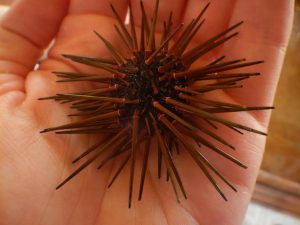“Preservation of wildlife populations depends on changing human behavior.” Alex Tewfik, an expert benthic biologist, had this quote on one of his final slides during a presentation he gave our class.
A change in human behavior can mean many different things. I made an active choice to disrupt my busy summer work routine to engage in an explorative field biology trip, something that strongly deviates from my status quo.
This change has been engrossing. Through today’s endeavors – exploring a nearby seagrass bed and a patch reef accessible by boat – I immersed myself in the rich aquatic diversity only tropical marine ecosystems can offer.
I encountered a variety of species, including a beaded sea cucumber (Euapta lappa), about six inches in length, concealed by seagrass and a large West Indian sea egg (Tripneustes ventricosus) resting on a seagrass bed. Neither were in motion nor interacting with other animals. At the further patch reef, I came across a small chocolate brittle star (Ophioderma cinereum), a large-polyp coral (Eugmilia fastigata), and a donkey dung sea cucumber (Holothuria Mexicana), just under a foot long. The brittle star was found under rubble, and the donkey dung was found in deeper water on the seafloor. Today’s most noteworthy site was a school of surgeonfish (Genus Acanthus) swimming in a school of about one hundred fish.
My class also collected urchins from the reef. Urchins often hide under ridges or rocky overhangs, making them difficult to spot. After scouring for an urchin, I noticed an odd juxtaposition of hues – tiny white rings encircling fiery orange spines projecting from a dark fleshy body. This was the first of three (Echinometra viridis) I collected from the reef. Tomorrow, my class will be recording each urchin’s dimensions and returning them to the sea.

I realize my participation on this trip will not accelerate the “preservation of wildlife populations.” However, for my own personal commitment to preservation causes and my proactivity to advocate for them, this trip has been transformative.
